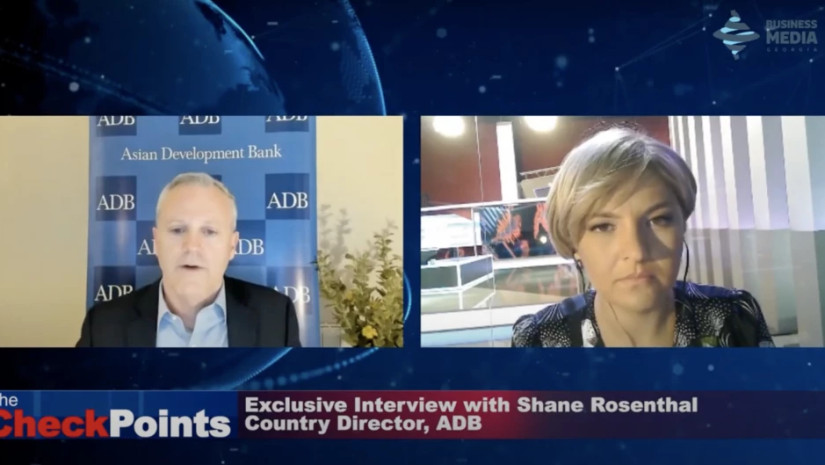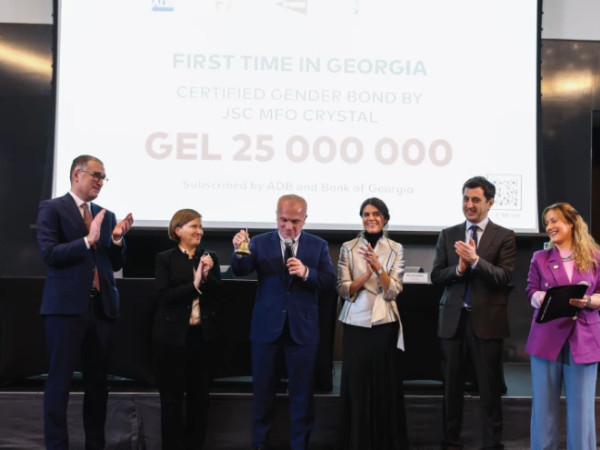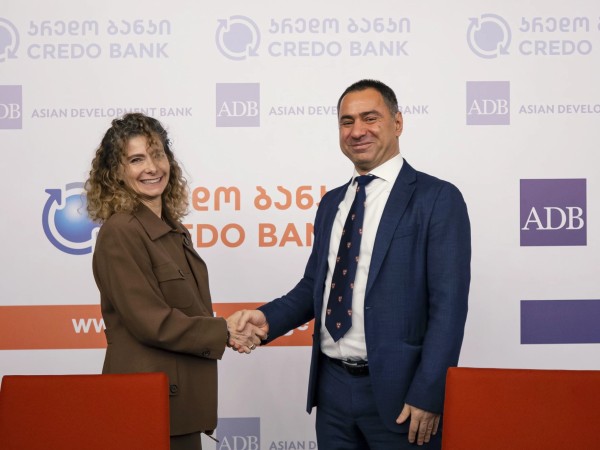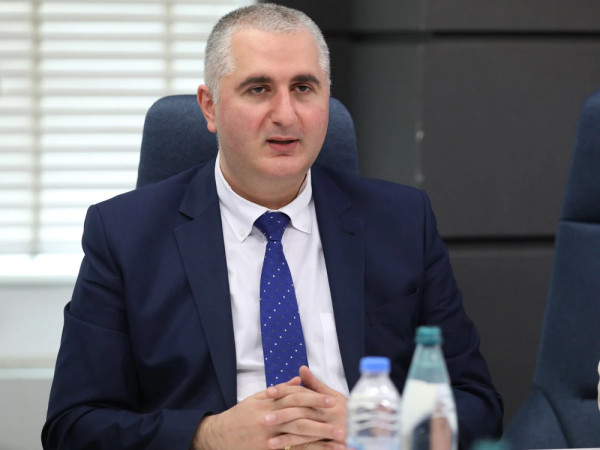The Asian Development Bank (ADB) raised Georgia's economic growth forecast by 5 percentage points. According to the previous forecast, the financial institution projected a 3.5% growth in Georgia this year. The updated forecast expects the economic growth of Georgia to stand at 8.5% this year. The updated forecast for growth in 2022 is relatively more modest. Until now ADB forecasted 6% growth in Georgia in 2022, and according to the new forecast, growth of 6.5% is expected next year. ADB notes that Georgia had exceptionally high economic growth in the first half of 2021 among non-oil exporting countries.
"Several oil-importing countries also had high economic growth at the beginning of the year. Among them is Georgia. Its economy grew by 12.7% in the first half of the year, and economic recovery affected all sectors, which led to a revision of our forecast to 3.5% this year in Georgia. We expect 8.5% economic growth, and in 2022, 6.5% growth is expected instead of 6%," the report said. The Checkpoints set down with Shane Rosenthal, Country Director, ADB for the exclusive interview.
ADB rose Georgia’s economic growth outlook from 3.5% to 8.5%. What are the main drivers?
Well, this is a big increase. Domestic demand is really the main driver. But we have also seen some external forces behind this: Exports are up significantly, tourism revenues 500 million dollars already for the first six months of the year and remittances are up something like 30%. There are many different drivers but it’s definitely happening and it seems quite significant. At the same time we all know that the inflation is quite serious – we’re expecting 9.5% this year and the impact on vulnerable groups, on all consumers is definitely there, and we see it also in unemployment and poverty figures which are about 22% and 21%.
One very interesting quote in this recent report and let me read it out: “Several hydrocarbon importers also enjoyed robust growth. Notably, Georgia’s economy grew by 12.7% in the first half of 2021 with the recovery in all sectors prompting upward revisions in its growth forecast from 3.5% to 8.5% for 2021, and from to 6% to 6.5% for 2021. Mr. Rosenthal, in your opinion, what part of this growth was caused by higher inflation, growing prices on the one hand and on the other – by the so called base effect?
These are ADB projections of real GDP growth. And keep in mind that we’re coming back from a very low base from 2020 when the economy experienced 6.2% contraction. So, 8.5% this year might sound a lot, but there is a lot of pent up demand and the realities things that I just mentioned like strong tourism – and we can all see that in Tbilisi and outside Tbilisi this year we’re back to already about 50% of the 2019 revenues in tourism. And I already mentioned exports are strong and remittances are strong. But again, this is coming from low base last year.
What are some of the main downside risks that you see to ADB’s forecast?
You know the main risk, I think, is a stalled vaccination rollout. We’ve got about a million people who have received at least one shot so far and I know that the goal of the government is to reach about 1.7 million or 60% by the end of the year. I think we can get there. I know that in last month we have seen quite an increase in daily vaccinations – up to 25 thousand people vaccinated per day – but there is a slowdown now, that’s also to be expected after many individuals sought their shots with surge in Delta variant in August and earlier part of this month. But there’s also a long way to go. And I think this is not something that’s going to suddenly be over.
In this context, ADB just approved 15 million USD loan to help the government of Georgia to procure and deploy COVID-19 vaccines. But today and you also mentioned that this process is stalled. We also see this lack of strategic communication with the population, with those who still have doubts whether to be vaccinated or not, and we already started hearing from different people involved in this process that we might have risks with the vaccines that we already have that are now in the fridge to be soon outdated. What is the goal of this loan?
Yes, I am very excited with this loan that the board approved earlier today. It’s 15 million dollars. It’s going to finance procurement of vaccines to cover about 300 thousand people – that’s about 8% of the population or 11% of adult population. Your question’s a good one – is there already enough supply? I think in the near term the situation is not restrained by the supply of vaccines. The real concern is vaccine hesitancy. That’s why under this program that ADB is supporting, we are going to be financing efforts to step up the information campaign, make the public aware of the science, of the benefits of getting vaccinated. This is a very important aspect for us and for other developing partners. But again, this is not going to end suddenly. This pandemic is something that will continue, I think, into the next year. Hopefully, the effects will be much slower because the number of people getting vaccinated is going to continue increasing. I am actually optimistic. I see these current numbers 35-36% of the population now. I think we can get that up above 50% this fall and beyond and we will continue in the New Year to reach levels where the economic confidence should increase where the type of vaccination rates would be similar to some of the more successful countries around the world.
These questions are being raised because what we see is the unfortunate trend in Georgia that the number of people getting their first jab is declining. That is a good indicator of the vaccine hesitancy that you also mentioned. Probably, you are getting this question often about recent loans approved by ADB in the context of 75 million EUR loan-refusal to the EU – the only conditioned loan at that time with the focus on Justice Reform.
First on our partnership with government around the pandemic response and the vaccines in particular, I talked earlier about the 300 million dollars support that ADB provided last year to help whether the worst lockdown impact on households and businesses. By the end of last year we were already working with the Government on the national vaccination deployment plan and we’ve done that also in partnership with some other development partners. But we took the lead in that process and we were very pleased with the results. Of course, it will be updated from time to time and that work is ongoing now. But your question was I think in regard to government’s approach to taking loans this year…
In the context of Georgian Dream’s refusal of 75 million EUR loan – the second tranche from the EU - with the motive that the government did not need any additional loans. This was a conditioned loan and you know that the main reform that was on the table was the Justice Reform which we have also talked about several times how important that is for Georgia. So, my question is what your take on this context is and also, about Georgia’s reform agenda in general – because ADB is helping Georgia on SOE Reform – for example, with Georgian Railways…
Georgia has a strong reputation as a reformer. Over the past two years ADB’s engagement here increasingly focused on the types of structural reforms that you just mentioned. And the loan that has been approved for the GSE, this started more than two years ago and in fact the loan was negotiated with the government in July – more than a year ago. So these are not the sudden decisions that either we or the government undertake.
This is the hard work of commitment over time to these reforms of SOEs. And this one in particular- of GSE – is a flagship, it’s something that the Ministry of Economy can be very proud of and that the government can use as a model for some of the other very important SOEs. You mentioned Georgian Railways. ADB is already working with the Georgia’s state-owned water utility and we are in the discussions with MEPA about the Georgian Melioration. And that’s what our focus is on. And the reason is that these institutions - their accountability, their transparency, their ability to act efficiently is really the core for the economy going forward. It’s not the problem of money, having enough finances, it’s about the institutions that are using that money, and fixing them and making sure that they are world class.
Coming back to 15 million USD loan to curb pandemic, you mentioned that this loan builds on ADB’s earlier support for Georgia’s COVID-19 response including 200 million USD policy based loan to strengthen social protection, fiscal and debt management systems – what has Georgia achieved in this direction?
Georgia was actually our model for quick response last year and ADB was simply a partner that helped the country with a lot of these actions that the government took. In some examples which you may be familiar with included expansion of pension scheme, increasing by 30 Lari the amount received for those 70 years old and up. By the way, 65% of that group was women, so this had a very strong gender impact; also the programs that supported SMEs, programs to ensure that households didn’t suffer under their utility bills at the height of the lockdown. These are just some examples. But it also helped Ministry of Finance with some actions that it was already taking and wanted to continue with to protect the fiscal and debt management systems that also focused on things like some of the liabilities that SOEs had for assessing those and handling those, same for fiscal liabilities associated with PPPs. So all of this is going on and it’s very important.
Today IMF says – and probably you have read the big 84-page document – that Georgia has a little fiscal space to cut expenses. Do you think cutting on capital projects is the right decision, because ADB’s support to Georgia is also heavily focused on capital projects?
Capital expenditure is the easier area to be more selective. That doesn’t necessarily mean cuts – it can mean delaying projects, it can mean and should mean being more selective when the government looks at which capital projects to plan for which time period. And we’ve already seen some of that with some capital expenditure programs being delayed and we support that. We have to be very careful in ensuring that scarce resources that the government has are very well used for programs that bring benefits that are true and sustainable investments in the future.
So for the future economic growth that we all need desperately in the post-pandemic period, you think that growing social expenditures would bring a bigger benefit to the economy rather than investing in capital projects?
I think there are three pillars if you like that should underpin that future thinking on how we spend resources. One is what we just talked about – ensuring that we don’t just look at how much we spend but we look more carefully how we are spending – this means strengthening and reforming institutions, focus on SOE reform is really central to that. The second is to be selective in choosing the projects that you spend that money on. This is actually an investment, not expenditure, so there should be return. And third – this is exactly the right point that you make, Elene – this is the right time to invest in human capital. That’s why the ADB approved a vocational skills program last year, and we are already working on the new general education program years ahead. Health sector is also very important – the pandemic has made a spotlight on health services in this country and there is definitely an agenda there to ensure that not just the government’s expenditure, citizens’ expenditure is efficient and provides value for money.
What is ADB’s main recommendation today to sustain the recovery that has started?
Human capital, structural reforms, selectivity in expenditure – I think these are the three pillars we look in our partnership with government.
But before that probably the pace of vaccination, still, to get to the point when we are really thinking about future. Thank you for your support to this country and for this interview as well.















